#and advocate for responsible breeding
Explore tagged Tumblr posts
Text
[🐟]: Okay, 2 things about Kaiser’s profile that was recently released:
One, I find it both sad and endearing that his favorite animal is a stray dog. Like, he could’ve just said dog, y’know? In many ways, he’s like a stray dog—without a home, both in a literal and figurative sense. Stray dogs are born into the world and left on their own to survive. Why? ‘Cuz they’re unwanted. Unplanned.
I’ve been advocating for the control of stray dog/cat population and responsible breeding. It’s just so heartbreaking to see dogs that are left to d*e on the streets. If I could, I take them all with me in a heartbeat. Anyway, I’m getting off track.
Kaiser probably sees himself in those poor animals. And oh my god that is so sad :((
Two, kind of ironic that he was born on Christmas day yet he hates receiving presents. Don’t you think? Also, don’t you think it’s quite amazing—as parents—to have a child on Christmas day? Maybe not for Kaiser’s mom and dad though. If he were born to a different set of parents then maybe he would’ve been seen as a gift from god.
Oh wait…

Crazy huh?
We always understood the emperor part but now here we are. What in the juxtaposition ?!
Okay, bye bye. I’ll go sob in a corner now.
179 notes
·
View notes
Note
What are some things to look for with accounts that post a lot about their pet pigeon? Like what can I look for to be sure the pigeon is being treated properly and not being abused/stressed for views? What are common questionable things you see accounts like those doing?
That is a REALLY good question, thanks for asking!
My take here probably won't be comprehensive, but I will at least try to give you a starting point to go off of.
Here are some red flags in pigeon social media content:
1. They have cross species content. A pigeon should not be interacting with any other species besides people on video. Nor in real life, honestly, but we're talking social media crimes. No other birds- not even ringnecks- and CERTAINLY no mammals. It's dangerous.
2. This can be a little tricky for the less experienced, but watching how someone interacts with their pigeon is key. Do they force interaction? Do they respect their bird? Is this light-hearted teasing that the bird doesn't mind, or are you looking at a freaked out animal? Or a freeze response? If you're not sure, ask around for opinions you trust on behavior. Sometimes it is the only way to make learning leaps.
3. Stupid decision making. You will probably know it when you see it. Bringing a pigeon outside with no harness. Talking about the freedom of birds and how they need to free fly outside. If it Seems like hawk bait, it probably is. (I don't mean that they do this on purpose, they don't. They are are in utter denial about deaths by hawk and their ability to prevent them by simply keeping their birds contained)
4. This one depends, but if you ever see content of a pigeon being held so that the general public can pet it without it being able to get away - usually a bad sign. I saw this connected to a very small rescue once and it was pretty appalling. These are touch adverse animals - you can't do that. And on that note-
5. Any form of advocating for 'struggle-cuddling', or holding the animal still until it stops fighting you, is a HUGE no. It is one of the fastest ways to learned helplessness, and also for some reason rampant advice in this fucking community. I'm bitter about it, obviously.
6. They shit on all breeding. It's not necessarily a sign of neglect but trust me, these are not people you want to be around.
Now, some GOOD things to look out for:
1. Excellent housing. You want to see a wider-than-tall space with a lot of solid perches not caked in 3 inches of gray-green cemented poop. Poop happens. They are birds. It gets dirty. But the cement is neglect. That took time.
2. They interact with their birds respectfully. Even if they might get a little silly with them, you won't see these birds getting squirrely and shying away. Consent does matter here.
3. They have primarily ethical breeds. The range of ethical is pretty wide here. But something like an extreme modena or extreme MOF (modern old frill, NOT the same as the classic old frill) might still show up in a regular loft, and that's okay. They need a home.
4. If they breed, they have some kind of plan. You might not even see it, but occasionally breeders will talk about what they want to do with their breeding project. And their plan shouldn't be fucking stupid. TRLs plan? Stupid. That isn't how breeding Works. So, someone with a brain in their head about this stuff.
5. Someone who is willing to euthanize an animal. Making a creature continue suffering through amputations or other surgeries that are too extreme for it... It isn't ethical. A pigeon can't survive long term with only one leg. We know this. Anyone who is trying to pretend differently is perpetuating suffering.
6. Someone who socializes any baby pigeons properly. That means no hand-raising, no people imprinting. Parent raising. Socialization techniques vary and most are valid.
7. Care more about the bird than the content they make. The bird shouldn't be a toy they force into situations for views.
Generally, just try to pay attention. Don't be afraid to ask someone you trust about what they think of an account. It can be hard to break out of the little echo chambers that start to form, but thinking critically about stuff like that will absolutely help you in the long term. Exposing yourself to better information and cutting off the bad stuff will advance you a lot farther.
A real quick body language lesson for you, on how to tell if a pigeon is comfortable.
A pigeon frozen in place, refusing to move, is not a happy pigeon. Their eyes may get wide and tight, their posture may be slightly tucked in and hunched. It can be easy to mistake them as a little sleepy if you don't know what to look for.
Sleepy don't look like that. Sleepy is loose posture, puffy feathers, squinty eyes, fluffy forehead, raised foot. Some or all of these.
Another sign of discomfort is more active defense. It might look like display dancing, but this bird is telling you to fuck off. They tend to dance and hop around more trying to avoid you, their necks will be stretched out really tall, their heads will dart around, they will interrupt themselves mid-coo to run away.
These are birds who are confident enough to tell you to go away, but still freaked out. I saw a video from a prominent rescue last week of such behavior where someone was "playing" with this poor guy who was totally boxed into his rescue crate with nowhere to go.
Pigeons need an exit route during intense interactions with us. You can't box them into a corner so they have nowhere to go.
A pigeon that WANTS to wrestle or what have you will not flinch away from you like this, or freeze like a rabbit. If you are wrestling and you pull your hand away, the pigeon should run up to your hand again if you offer it from a distance. If you are petting the pigeon, the pigeon should lean their head down, or groan, or nesty grunt, or puff their feathers up, or try to preen you!
This got a little long, but I genuinely hope that was helpful to you. And again, great question.
If you like my posts, please consider tipping me on ko-fi!
75 notes
·
View notes
Text
I never post here anymore due to personal stuff, but I want to reach out on all my socials about this because people need to see it. Can I just say that I am so incredibly disheartened by some people’s responses to what is happening in the South Eastern US/Appalachia? I really can’t explain the level of devastation that is unfolding here under Hurricane Helene. There are people trapped in my childhood neighborhood without power or water because of downed trees and power lines and flooding. I couldn’t get ahold of my family for more than a day because there was a massive cell service outage in my state. Parts of where I grew up will not have electricity for three weeks. My family could be without electricity for three weeks. I didn’t know if my best friend was okay for 12 hours because there was no way to communicate and we live two hours away from one another. I’m entering day 3 of not having electricity.
And frankly, we’re on the luckier side. A town my family has visited every year for the last 20 years is fucking gone- leveled by flooding from a failed dam. Everything including the road is completely washed out, and this is in the fucking mountains. And that’s just what we know about so far during what is still widespread cell service failure. There are entire interstates that have washed out or fallen apart during mudslides- whole towns are gone, and people cannot call for help.
And the number of people I’ve seen, people who say they’re advocating for MY rights as a trans/queer person, who have fully dismissed this in favor of taking to twitter to make comments about how it’s “Trump Country anyway” and how we “deserve it” and “should’ve voted blue to keep this from happening” is brutal. Every time something happens to us down here, out of touch middle class liberals are so quick to blame our collective region of the country for struggles we do not have the time, energy, money, or legislation to prevent. As if we’re fucking stupid and should be purged, like we somehow matter less because our politicians are a breed of fucked up that a whole lot of us disagree with. We aren’t a monolith and we are right fucking here, and mocking us on twitter in the middle of a humanitarian crisis is not going to help your case, I promise.
I cannot explain to you what it’s like to hear somebody with your mother’s accent describe that they can’t pull people out of cars quick enough because the flood water is moving too fast. Everything I’ve ever known is either blipped off the power grid or under water. I’m begging you, please see us as people who are suffering and not as a monolithic entity.
There are trans and queer people here, just like everywhere else. We are suffering at the hands of legislation we don’t believe in, legislation that thinks we should die, and now a mounting natural disaster that we still don’t know the full extent of. There are poor communities, communities that are predominantly BIPOC, disabled people, it goes on. There are a whole lot of us who don’t fit the criteria of the pro trump agenda, who don’t match the bill of what an American southerner looks like in the minds of those who have never been here, who are actively suffering. We ARE voting blue both locally and on the federal level.
But here’s the kicker: it doesn’t fucking matter that we’re here. My life doesn’t mean anything more than my neighbor who might hate who I am to their very bones. Nor am I more deserving of aid than them, even if I hate them right back. The concept of withholding aid or hesitating to help particular regions because of what their government officials believe is heinous. Hell, even if regular civilians believe it too, it’s still wrong and morally reprehensible. Similarly, providing aid with the caveat of “converting those stubborn hicks” to the cause is downright evangelical and fucking evil. This is a humanitarian crisis, and people need help. And truly if you think it would be better if the south couldn’t vote, or that we collectively deserve this on some moral or karmic basis, I really need you to think critically about those exact talking points because they should sound shockingly familiar. Governments should help their people, and that should be a bipartisan priority. I don’t give a fuck what anyone says- people who are ignoring this because of where it’s happening are vile and need to get themselves sorted out. And the people who do think this is some sort of universal comeuppance for this part of the country can- and I mean this truly deeply, from my heart of hearts- go straight to hell.
I’m going to be posting resources to help those in need in the Appalachia region, as well as Florida. I’ll include shelters, food banks, etc. I’ll have them out soon. I don’t use this blog really anymore but this is the least I can do.
77 notes
·
View notes
Text
"Cassian would be such a good father!" "He's such a girl dad!" "I hope we get a Nessian baby in the next Acotar book!"
That would be the start of a horror story. Not because of the risk of death thing, since it was taken care of at the end of ACOSF. No. Nessian are not ready for a kid, and quite possibly never will be at this rate. There are 101 reasons why neither Nesta or Cassian would be good parents at this current stage in their relationship and their personal development, especially if the dynamic we see in the HOFAS bonus chapter is anything to go by.
When you become a parent, you are responsible for your child's physical, mental and emotional wellbeing, and should provide for them within the best of your abilities. That goes beyond food, shelter and clothing. It means support, love and encouragement, fostering a safe, nurturing environment for them to grow up, free to be themselves.
Nessian can't give that. Not entierly anyway. I don't believe that either of them wouldn't love their child. What concerns me is if they would love their child enough.
Cassian has proven time and time again that he will chose Rhysand over Nesta, no matter what. If he can't chose his damn mate, how could he chose his child. What would he do if it came down to choosing between his Rhysand and his mate & child?
We've established that the mating bond is likely to be the Cauldron's form of selective breeding based on power, so it's highly likely that their child would be incredibly powerful too. The IC have been shown to go as far as lie and manipulate their own in order to exploit their powers. That is what happened to Nesta in ACOSF time and time again. Hell, it's been happening since the IC met Nesta in ACOMAF.
It's not beyond possibility for the IC to lie and manipulate or guilt trip Nessian's child the way they did to Nesta, so they can exploit that power. The worst part is, Cassian, thus far, hasn't given us a reason to think he wouldn't go along with it. If Amren, or Rhysand decide they need Nessian's kid to do something "for the good of the court" but Nessian's kid doesn't want to, or is reluctant? Would Cassian really stand up to Rhysand for the sake of his child? He doesn't love Nesta enough to stand up for her, why would he try to stand up for his kid?
Even if he did stand up for NK, (I'm calling his and Nesta's hypothetical kid NK from this point on, to make things easier) what's to stop the IC from going behind his and Nesta's back? What's to stop Cassian, from going behind Nesta's back on the off chance that he agrees with the IC but Nesta refuses to allow it (assuming NK isn't an adult, which in this world is about 50-80 years)? I wouldn't put it past Nesta's own sisters, and so-called family to undermine her rights and position as NK's mother by going behind her back and making the kid do what they want anyway.
They might not even bother hiding it from her and, like the intervention, tell her it's happening, regardless of how she feels. What proof do we have that Cassian would stand up for her or NK? Would stop the IC, for his child's sake, and defend his mate's right as Nk's mother? He wouldn't. Current, cannon Cassian, wouldn't. He simply doesn't care for Nesta enough to defend her rights and boundaries as his mate, so we can't believe he would defend NK from the IC, if it came down to it.
Then there's the issue of Illyria. Some people are of the opinion that the bat boys would send their kids to Illyrian war camps because it's their culture, while others argue that they wouldn't because it was traumatising. Personally, I think certain parts of Illyrian culture needs to become part of their history instead, like the child soldiers, and wing clippings, for example, but that's not the point.
Rhysand claims to advocate for change and equality in Illyria by thrusting a sword into a woman's hand, and basically forcing them to train too. Based on the argument with Devlon in ACOFAS, it's safe to assume that some level of force and authority is being used to make the women train. But handing them a sword and making them train, presumably in skin tight leathers, while men gawk and stare at them, isn't Equality.
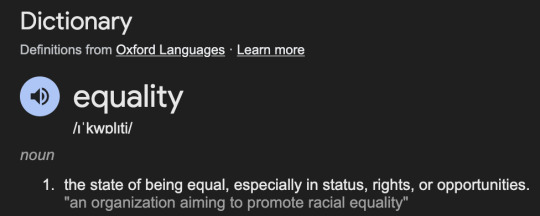
Equality, by definition, means that men and women have the same status, rights and opportunities.
Opportunity, by definition, is "A set of circumstances that makes it possible to do something".
Equality in Illyria won't exist until men and women alike have the choice to not be warriors. Women like Emerie are lucky enough to inherit businesses, but the social circumstances mean that while women may, technically, run businesses, social pressures prevent it. They either wouldn't get business, or other Illyrians might refuse to sell business licenses or stock to them.
These same social pressures are what the IC apply to women when they make them train with the men, without considering what they want. These are the same social pressures that the IC would apply to NK if they decided that they wanted her at these camps. Not only would they consent to leaving one of the youngest members of their 'family' with a people who are so openly hostile to them and to women in general, what are the odds that they would hear any objections from NK?
If NK said they didn't want to train, but the IC wanted them to become a warrior, either to help protect Velaris or to, once more, exploit their powers, or their potential strength (Illyrian killing power, whatever that is).
Cassian claims to love his people, but won't provide them with the opportunities they deserve. He doesn't look or listen to find out what they need, and he did the same to Nesta. He forced her to do things she didn't want to, without asking or understanding what she wanted or needed. If his child were to refuse training, or express interest in other areas, would he ignore them too? Would he force them to train as well?
If his child went through something traumatic (which is pretty much guaranteed with the IC as their family), would he resort to the same methods they used to break Nesta? Once again, we have no reason to believe he wouldn't strip his children of their personal choices, all so they become loyal, complacent weapons of the IC.
What's worse, is that those children may even become weapons to use against Nesta. Who's to stop the IC from telling Nesta's own kids lies and stories to turn them against her? They isolated her in an attempt to break her into compliance, what are the odds they wouldn't bar Nesta from her children? They used Elain to strong arm Nesta into doing their bedding, who's to say they wouldn't use her children? Or manipulate her children against her in some way? Who's to say Cassian wouldn't just let it happen, or even actively participate in the manipulation.
Cassian's loyalty and dedication to the IC would always come before Nesta and their potential children. He's not ready to be a father because he could never put his children before his brother or the rest of his family. The truth I'm seeing is that Cassian, clearly, doesn't love his mate, and probably wouldn't love his child as much as the IC. He wouldn't love them enough to stand up for them. He wouldn't love them enough to not manipulate or coerce them into using their body or powers in a way that the IC approves of (yeah, I also never thought I'd have to read, much less write, that a parent wouldn't love their kid enough to not manipulate them). He's unfit, at this point, to be a parent.
Moving on to Nesta, who still has several unresolved mommy issues, clearly. Her mother raised her to marry a prince and, assumedly, be the perfect wife. Given that the way women are treated in the mortal lands, it's not a stretch to imagine that part of that training would mean obeying her husband (or in this case, mate,) and looking the other way if he cheated, amongst other things.
These values may explain why Nesta isn't as assertive against the IC or Cassian as we'd like. Even if it's subconsciously, some of those values seem likely to be so ingrained in her that she can't break away, as we see when she takes Rhysand's abuse in HOFAS bonus chapter. It's also a fair to assume it may be part of the reason she does what the IC ask when searching for the trove. I'm not saying that those traditions and her mommy issues are the only reason why, there's plenty of other reasons why Nesta acts in these ways, including the brainwashing she got in ACOSF, but it's reasonable to assume that they're at least part of the reason why.
Speaking of brainwashing, Nesta was brainwashed in ACOSF. She was beat down and forced into submission to the point where she even tells Gwyn that she's glad Feyre did that for her. Nesta gave up her dream and desires to travel, her power, her autonomy, and her aspirations just to be subservient to the IC. She became barely a shell of who she was by the end of that book.
That's not to say this is Nesta's fault. Not by a long shot. This is a result of abuse at the hands of the IC, her mother and Cassian. Abuse that left Nesta way more vulnerable and malleable than she was before, stripping her of anything the IC didn't approve of. Meanwhile Cassian did nothing. She thought that she had to earn Cassian's love, despite him being her so-called mate. She seriously thought that she, as her parents' daughter, had to earn their love, for fucks sake people.
What happens if the IC decide that they don't like way NK is growing up, or that they don't like how the kid is dealing with potential trauma? Will they push Nesta into believing her own child doesn't deserve her love? Will Nesta, at any point, consider if her child doesn't deserve her love if they don't have an interest in training or court affairs or training their powers? f
Nesta, like Cassian, is unfit to be a parent, for similar, yet very different reasons. Nesta's self hatred and the lack of ability to stand up to the IC (not saying that's her fault) would bring into question if she would be able to stand up for her children. If Cassian won't stand up for either of them, then how would she, if she feels that her kids deserve better, and that the IC are better. If she feels powerless, and weak, because of their abuse, she likely wouldn't be able to stand up to them. If they come after her together, she wouldn't be able to stand up to them.
I'm not saying any of this is Nesta's fault. She is a victim of abuse. Plain and simple. However, it's also reasonable to decide that she'd be unfit as a parent at that point in time, in large part, due to the environment that was created around her. It's not an environment to raise a child. Especially since Nesta is so brainwashed that it took a stranger from another world (Ember) who knew nothing about her pointing out how messed up her situation was for her to begin considering it as a possibility.
Nesta's own self hatred wouldn't allow her to see anybody but herself as the problem, so she likely wouldn't stand up to the IC or Cassian for her kids, in part because it was so ingrained that she had to obey her husband, but also, in part, because she's less likely to be able to fully understand if or how the IC or Cassian's actions hurt them. Or to consider those actions unnecessary. Even if it came down to mating bond divorce being the best option, if kids are involved, she might not end up going through with it, which can often be worse for kids than a divorce.
Nesta would love her kids so fiercely, but it would be difficult for that love to outweigh the brainwashing, self hatred and abuse that has been engraved into her mind for practically her whole life. She wouldn't love them enough for it to overshadow those voices in her head, through, once again, no fault of her own.
Then the kid themselves. Bringing a child into that mess would be just as torturous for the poor kid.
Imagine what it would do to a child, seeing your uncle threaten to kill your mother, while your aunts, and father and rest of your family let it happen. All because your mother tried to do the right thing?
Or, another scenario, is if NK overhears their aunt (Mor) complaining about how horrible their mother is, and how she belongs in a place you were taught was terrible and evil because she's just like them.
What would it do to NK, to grow up hearing Amren, somebody their Uncle and mother trust and love, refer to their mom in reference to how useful her powers are, or to NK themselves by how useful they are to the court.
NK would likely be forced to do things they don't want to 'show a united front' or to train because it sets an example to the Illyrians. NK would be exploited for their potential power, an initiative likely spearheaded by Amren, and trained to be just as blindly loyal to Nyx as Cassian is to Rhysand.
The child would likely be left to Amren to train, with or without Nesta's consent, and even if she did find the strength to vehemently reject the IC's methods of trying to raise her kid, she'd be punished. She'd be locked up and told she was bad for her own child's wellbeing, while breaking down the poor kid the way they broke her down. They stripped Nesta of her autonomy and freedom. If she had a kid, it wouldn't be long before they stripped her of her role as a mother.
At the end of the day, Nessian wouldn't be great parents, because the IC aren't a great family. They have issue upon issue to work through before they can consider their relationship even somewhat functional or healthy, much less bring a child into it.
So no. Nessian doesn't need a kid. They'd be terrible parents and need to figure their own shit out before they even consider having a kid. Nesta isn't in a good place, mentally, physically, or emotionally, to be able to act with the kid's best interests at heart. Meanwhile Cassian is either delusional enough that he thinks Rhysand's best interests equal everybody's best interests, including his kid's. So, he won't bother to stop Rhys or the IC from using the kid however he wants.
Which is why I'm begging you. Please. No. No Nessian kid in the next book. Not in any book. Not unless SJM somehow fixes the relationship between Nesta and Cassian, and by that, I mean figure out how to fix Cassian's character from ACOSF.
(On a side note, Nesta's basically still a kid by fae standards, and so is Feyre. So why? Why would they not wait anyway? Cause ew.)
#anti inner circle#anti rhysand#anti acosf#nesta deserves better#pro nesta#anti ic#pro nesta archeron#anti amren#anti mor#nesta acotar#anti rhys#acotar critical#anti cassian#anti feysand#anti morrigan
135 notes
·
View notes
Text
The World Food Summit of 1996 approached food security through the principles of ensuring there is enough safe and nutritious food that can be accessed daily to meet healthy dietary needs and food preferences. By definition, this is a desirable and worthy goal. However, in the years since, food security has developed into a paradigm which does not question the underlying power dynamics and the reproduction of material conditions that make food insecurity a permanent feature of the global order. At its core, the food security paradigm deals only with access to food, without challenging the political and economic structures that determine and control access, as well as distribution. By failing to address the root causes of hunger and famine, the food security paradigm makes it impossible to end hunger globally. Of course, many people worldwide possess food security, but this is restricted to increasingly limited geographic pockets. In terms of the people localised in one area, food vulnerability is influenced and determined by class, race, gender and, of course, citizenship status. Globally, “underdevelopment” and “de-development” lead to widespread food insecurity across areas. Another problem with the food security paradigm is that it is easily co-opted to generate partial answers that pose no threat to the corporate food system, or worse, that even open up new profit opportunities. Accelerated by other crises, the food security paradigm becomes ever more dependent on aid, be it through direct food delivery, cash transfers or small development projects that cannot compete with the food giants and their price-setting powers. In practice, a “science of food security” emerges, one which takes as its focus calories and the output that is compatible with precision agriculture having the aim to increase crop yields and to assist management decisions using high technology sensor and analysis tools. This model tends to be reliant on “Green Revolution” technologies that rely on chemical fertilisers and pesticides and that are tied to colonial projects and corporations, in order to optimise resources in aid response and/or development projects. In this rationale, food insecurity can be addressed by reaching optimum yields of certain crops that should meet the demand for fats, fibres and protein. All of this is carefully managed and data-driven. Precision farming is advocated by the Alliance for a Green Revolution in Africa (AGRA) with the objective of optimising, “agricultural value chains […] critical in advancing food and nutrition sufficiency without increasing the size of land under cultivation.” The framing of food that reduces it only to “optimal input” relegates vital elements of food production and the culture of eating, like territory ownership, taste, heritage, care, well-being and connection as secondary. This reductionist approach has, though, proved useful to corporate agriculture, since it reinforces the case for genetically modified crops (GMOs), more efficient fertilisers, and the standardisation of food production for market purposes. Advocates of plant breeding technologies (including GMOs and hybrid seeds) argue that government overregulation is an obstacle to achieving food security. Overregulation, as the argument goes, denies populations the opportunity to grow crops that have increased nutrient use efficiency and are more resilient to climate shocks.
[...]
The paradigm of food security is about optimising productivity. It’s true that productivity matters – after all, feeding the world requires enormous quantities of food. But if productivity is approached solely as a technological problem, it reinforces the tendency to fragment the quantitative and qualitative aspects of food production and consumption. On the quantitative side, production for food security is viewed as a challenge of multiplication. Whereas division, that is, distribution of food, is left to logistical planning. This ignores what Raj Patel identified in his influential 2007 book Stuffed and Starved, as the bottleneck of power that concentrates international food distribution among a small set of corporations. This bottleneck excludes the poor and small-scale food producers from decision-making. It also normalises worrying tendencies, such as an overreliance on industrial animal exploitation as a protein source, which has direct health implications, as well as longer term consequences like the proliferation of new viruses, greenhouse gas emissions and inefficient use of water and soil.
28 May 2024
61 notes
·
View notes
Text
If you are a "disability advocate" be normal about emotional support animals. I am not asking. Do it.
The only time I ever see ESAs brought up by non-handlers in disability circles is to complain about them. Mainly, to complain about people who bring them into public spaces. This is fine, they're not supposed to be in public and it does cause issues for service animal handlers, but the problem is when the criticism extends to criticizing the concept of ESAs, which happens quite often. I've recently seen more disabled people and allies advocate for more restrictions on ESAs, or for them to stop being protected altogether, and I need to emphasize that this is an incredibly dangerous, ableist stance.
First and foremost, ESAs are a real thing in the U.S. If you're from outside the U.S. feel free to chime in about how they work where you're from, but I'm from the U.S. so I can only offer my experience. ESAs are recognized by the federal government under the Fair Housing Act (FHA). The category that includes service animals and ESAs is called "assistance animals".
ESAs are not legally pets. They have fewer rights than service animals, but they have more rights than pets. ESAs are not subject to "no pet" rules in housing, nor are they subject to pet fees or pet security deposits. They are also generally exempt from breed and animal type restrictions. The law has some caveats about this like not causing undue financial stress to the housing provider or damage to the property. These rules also exist for physical accessibility (i.e. wheelchair accessibility), they're generally to protect against significant damage or alterations to the property without the permission of the housing provider. If the presence of an animal doesn't cause a health and safety risk, doesn't cause excessive damage to the property, and is necessary to afford a disabled person equal use of the property, then landlords and other housing organizations pretty much have to act like the ESA isn't there.
ESAs can be any animal. Most are dogs or cats but birds, rodents, snakes, pretty much any animal that's legal to own can be an ESA. Of course, just because it's legal doesn't mean it's ethical. Unfortunately, sometimes animals that can't reasonably be kept in a home by a private keeper, like primates and alligators, are claimed as ESAs. This is an obvious abuse of the system but it's difficult to prevent without harming legitimate handlers. In my opinion, focusing on tighter restrictions and more bans for exotic pets would do more for animal welfare than focusing on being weird about ESAs.
One of the common statements I see non-handlers make about ESAs is that they're just pets and don't serve any special purpose. This isn't the case. ESAs must help with at least one effect of a person's disability in order to qualify as an ESA. One of the main purposes of ESAs is suicide prevention. Keeping up spirits can be very difficult for people with mental and physical illnesses, we might sometimes feel that we're not contributing anything to the world, that things would be better off without us, or that the distress we experience isn't worth pushing through. Having an animal that relies on you gives a sense of importance and responsibility. If you die, your ESA will have to adjust to a new environment and go through the stress of change. There's also a possibility that they could be alone without care if no one realizes you're gone, which unfortunately does happen with people who live alone sometimes. ESAs also motivate us to care for ourselves. Many severely mentally ill people, as well as many physically disabled people, struggle to motivate ourselves to get out of bed and live life. It can be easier to do nothing than to deal with the pain and fatigue associated with moving around, even if our health suffers as a result. Caring for an animal requires us to get up and move around our living space, sometimes doing things for ourselves in the process. ESAs can also help encourage us to take medications, stay off of addictive substances, go to doctor's appointments, and do other things to stay healthy in order to be able to continue caring for our ESAs. Basically that Simpsons "do it for her" meme.

ESAs are disability aids. They're important. They keep disabled people alive and healthy. Questioning their right to legal protection is ableism.
#actually disabled#cripplepunk#actually mentally ill#physically disabled#neurodivergent#neurodiversity#emotional support animal#disability pride month#disability awareness month#disability acceptance month#suicide mention tw
40 notes
·
View notes
Note
Now that you have a second Persian...do you know if you're a fan the breed or if you just like Arthur cause hes a chill dude? Seems to me Arthur is in a class of his own 🤎
Oh I’m 100% a fan. Theyre so funny looking and so charming. Everything they do makes me laugh because they just look stupid.
That being said I can’t bring myself to support people breeding them. I’m a huge adoption advocate (obviously) but I’m also pro shopping responsibly when it comes to dogs. However, I don’t really think breeding cats can be responsible in the United States.
I obviously can’t speak for other countries but in America we have such a HUGE overpopulation problem with cats. At this point in time I just think breeding cats is irresponsible, end of story.
Also, please don’t hear me say that I think everyone and their brother should be breeding dogs and buying dogs from a breeder. I still think more people should adopt rather than buying a puppy. However, I don’t think breeding dogs is inherently irresponsible the way I think breeding cats is.
#obviously these are just my opinions so if anyone is gonna send me an angry anon abt this consider this:#I do not care ♥️#if you want to POLITELY ask me questions tho feel free#< obviously not directed at this ask. you were lovely and kind#ask
81 notes
·
View notes
Text
Dandelion News - September 1-7
Like these weekly compilations? Tip me at $kaybarr1735 or check out my new(ly repurposed) Patreon!
1. Rescue Dog Who Helped Raise Dozens of Foster Puppies Finds Forever Home
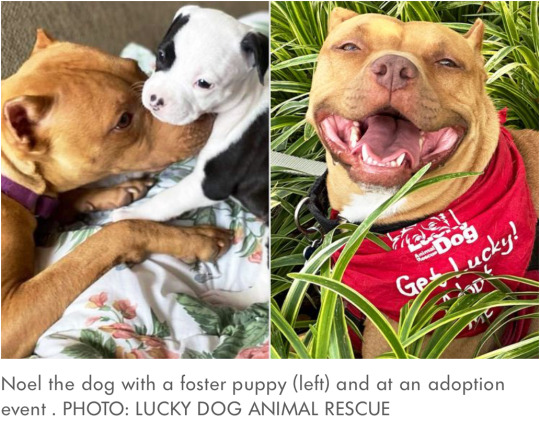
“Three and a half years ago, Noel arrived at Lucky Dog as a pregnant pooch pulled from [an] animal control shelter. […] Once the puppies were old enough to start life on their own, Lucky Dog found homes for all of them. […] Noel was an "amazing mom" to over two dozen foster puppies while staying at [a foster] house.”
2. Radiant cooling device uses significantly less energy than traditional air conditioning

“Testing of the device […] showed the cooling device capable of cooling the skin by approximately 7.3°C. It also showed that it consumed 50.4% less energy than an average air-conditioner of comparable ability. The research team notes that the device can also be run in reverse, to serve as a radiant heater.”
3. How a Native elections official is breaking down voting barriers in Arizona
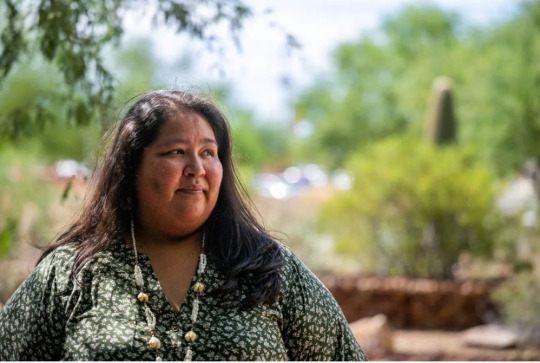
“Gabriella Cázares-Kelly, Pima County Recorder, [… ran for office in 2020] to represent people who were being ignored by the democratic system and denied the right to vote. […] “People started getting the voter registration cards back, getting their voter IDs in the mail, and they were so excited to show me or thank me for helping them register,” she said.”
4. Scientists are growing [coral] babies in a lab to save animals from extinction
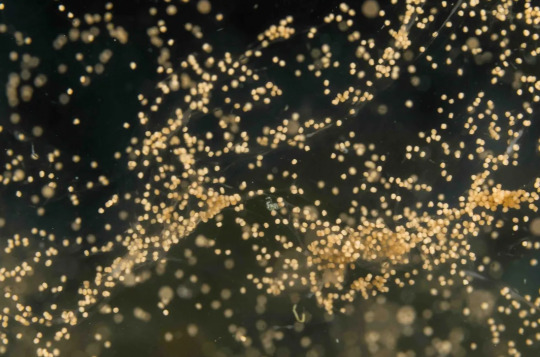
“Each August, corals in Florida release their eggs and sperm into the water[, … but “they] can’t reproduce on their own anymore.” [So, researchers are] collecting and freezing the spawn and growing them into genetically diverse baby corals that can be replanted into the wild[….] These resilient corals could pass important adaptations to their babies[….]”
5. New Legislation Will Accelerate Offshore Wind Energy in Delaware

““The responsible development of offshore wind and the transition to renewable energy is essential for the protection of wildlife, habitats, and communities from the havoc of climate change[….]” “This legislation is the product of careful consideration and input from multiple state agencies, industry experts, energy researchers and environmental advocates[….]””
6. Removal of Apache Trout from Endangered Species List Due to Collaborative Conservation Efforts
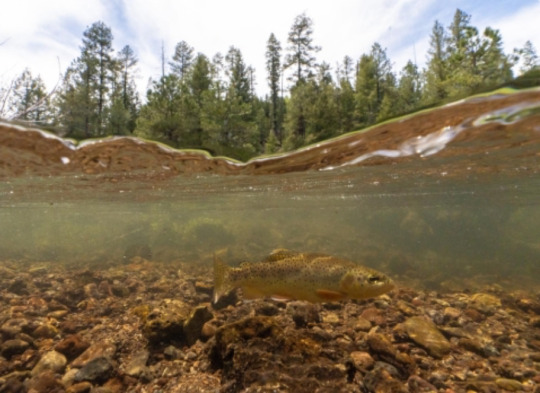
“[A]fter more than five decades of recovery efforts by federal, state and Tribal partners, […] the restoration of Arizona’s state fish marks the first […] trout delisted due to recovery, a significant conservation success[….] The Apache trout is found exclusively in streams of the White Mountains in the eastern part of Arizona […] and is sacred to the White Mountain Apache Tribe.”
7. [Texas] State court rules Austin must release files on police complaint

“Under the act, records of any complaint – even if no disciplinary action was taken – must be handed over to the civilian-led Office of Police Oversight. [… T]he ruling ushers in a new level of oversight of the complaint process and the department writ-large.”
8. Super-rare hairy-nosed wombat caught waddling through a woodland in Australia
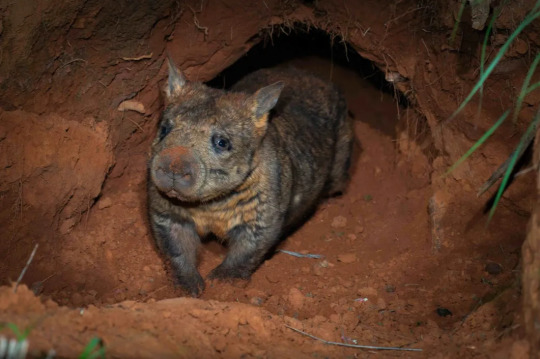
“Ecologists at Australian Wildlife Conservancy (AWC) say the video footage provides exciting evidence wombats are breeding in the refuge again. […] There are only 400 of them in the world, making them rarer than the giant panda and the Sumatran tiger. […] “Although this isn’t the first joey born at the refuge, it is the first juvenile spotted for a few years.””
9. The country’s biggest electric school-bus fleet will also feed the grid
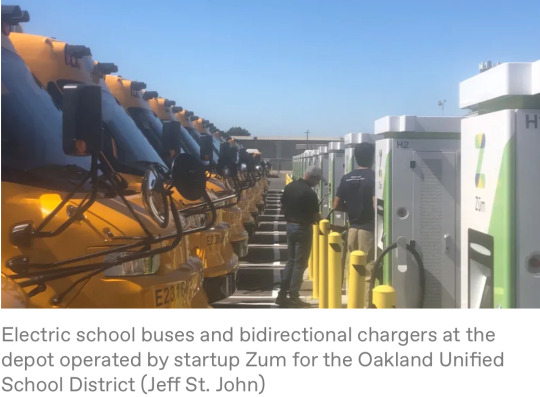
“[The] country’s first all-electric school-bus fleet[,…] which serve the district’s special-needs students, […] can charge with low-cost power and discharge spare capacity at times of grid stress[…. V]ehicle-to-grid charging is something for which electric school buses are particularly well suited.”
10. The Push to Save Horseshoe Crabs Is Gaining Momentum
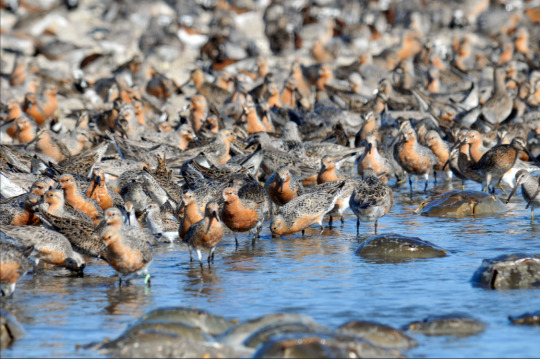
“Conservationists hope new restrictions on harvesting and synthetic alternatives to a crab-blood compound used in biomedical testing can turn the tide for the ancient arthropods, whose eggs are a vital food source for Red Knots [threatened migratory birds]. […] Now conservationists are in the thick of a multi-pronged push to save both species.”
August 22-28 news here | (all credit for images and written material can be found at the source linked; I don’t claim credit for anything but curating.)
#hopepunk#good news#dog#foster dog#animal shelters#dogs#air conditioning#energy efficiency#native#arizona#voting#politics#coral#conservation#wind energy#wind farm#delaware#trout#fish#apache#police#police accountability#wombat#australia#school buses#electric vehicles#horseshoe crab#birds#migration#endangered species
21 notes
·
View notes
Text
Few things are more fundamental to a society than its traditions. They guide our actions through difficult and changing times. They keep us grounded and steady. They build on the wisdom of our forerunners. At least, that is the way conservatives, usually, look at the world.
But on one issue—school vouchers—some conservatives are playing the role of radicals. The general goal of vouchers is to allow families to use government funds to pay tuition at private schools, including religious schools. The idea has been around for more than a half-century but had gone almost nowhere in the U.S., until very recently. In just the past few years, it has gone from the political desert to a core issue that is sweeping across Republican-led states.
The general idea of vouchers is radical enough, but the particular form of these new programs is far more so. Fourteen states and counting have now passed legislation creating voucher (or education savings account) programs that share some key properties. They are universal (or nearly universal), meaning that all families are eligible. They involve no meaningful public accountability or way to judge their success. They allow private schools to charge tuition over and above the voucher amount. And, finally, they are flexible in that funds can be used even to cover homeschooling expenses and other educational goods and services, such as computers and tutoring.
These aren’t just any vouchers. They are “super-vouchers,” as I call them, that promise to produce the most radical change, of any kind, in U.S. education in at least 70 years. It represents not just a change in policy or strategy but a rejection of three foundational traditions: separation of church and state, anti-discrimination, and public accountability for educational processes and outcomes funded by taxes.
In this post, I describe the threat that today’s universal voucher programs present to these traditions, and I attend to some potential counterarguments from voucher supporters.
The separation of church and state tradition
America’s education traditions can be traced far back in our history. While the U.S. Constitution does not mention education, it was an issue actively discussed by the nation’s founders, and other elements of the Constitution have a heavy bearing on education. The First Amendment includes the Establishment Clause, which prevents Congress from either supporting or limiting the free exercise of religion. This language has long been understood to imply that governments should not fund religious organizations (including religious schools), especially in a way that preferences one religion over another.
As a result of education’s omission from the Constitution, primary responsibility for education was ultimately delegated to the states. Education is one of only a few topics covered in every state constitution—with all states guaranteeing universal access and most specifically mentioning public education. To many, this means that education should be not only funded by the government but accessible to all, subject to public oversight, and, yes, non-sectarian (non-religious).
It’s easy to see how vouchers, especially the new breed of them, violate these principles. Vouchers provide government funds to churches, despite the historical separation of church and state. Voucher advocates argue that today’s voucher systems are legal, and our current Supreme Court seems to agree, but that doesn’t change the fact vouchers will entangle the government and religion. With any voucher program, the government must decide which schools are eligible to receive funding. Will the public—in particular, citizens in red states where universal ESA programs are most popular—be just as willing to fund Islamic, Hindi, Mormon, Jewish, and atheist schools as they are Christian schools? That’s not clear. Even if states treat all religions equally, some very public battles over religious schools will surely follow. Already, many voucher-supported religious schools have been the subject of front-page newspaper headlines regarding their most controversial teachings. We should expect this to continue.
Voucher proponents sometimes try to refute the idea that the separation of church and state for schooling even applies, pointing out that publicly funded schools taught religion in the early 1800s, with children reading from the Bible. However, a more complete telling of our history would note that the need for a separation between church and state became clearer as the country—and its students—grew more diverse. We shouldn’t use past wrongs to justify making the same mistakes today.
The anti-discrimination tradition
The U.S. Constitution, under the Fourteenth Amendment, establishes equal protection before the law. Ratified in the wake of the Civil War, this was meant to remediate the blatantly unequal treatment of Black people in every aspect of life, created by slavery. The Fourteenth Amendment can be viewed as reinforcing the accessible-to-all principle embodied in state constitutions.
This was not nearly enough, however, to provide meaningful access to Black Americans. Civil War Reconstruction efforts on education were modest and short lived. The Court’s 1896 Plessy v. Ferguson decision also established the principle of “separate but equal.” Even that low standard for access was not achieved, as few states provided more than a pittance in funding for Black schools. They were anything but equal for at least another half century. Then came the Court’s landmark 1954 Brown v. Board of Education decision, which reinterpreted the Fourteenth Amendment and rejected the separate-but-equal doctrine in schools. The decision began to slowly reorient public education towards an anti-discrimination tradition. Solidifying it was the Civil Rights Act of 1964, which banned discrimination on the basis of race, ethnicity, and national origin, and expanded the federal government’s authority to enforce anti-discrimination law in publicly funded programs (including public schools).
Most forms of vouchers undermine the anti-discrimination tradition. While private schools cannot legally discriminate based on race because of the Civil Rights Act, they can discriminate on most other dimensions, including religion, gender, gender identity, sexual orientation, class, income, and disability status. Moreover, the protections against racial discrimination are stronger in public schools, with additional avenues for recourse available to public school students through the U.S. Department of Education’s Office for Civil Rights.
Discrimination issues often arise in admissions, and private schools leaders believe strongly in their right to selective admissions requirements. Put another way, private school leaders feel they should be able to determine which students get in and which get turned away. While not all admission requirements are inherently problematic, private school admissions practices leave the door open for discrimination. And with potential discriminatory treatment hidden behind opaque admissions practices, it will be exceedingly difficult to identify discrimination where it occurs. When schools are allowed to discriminate on one set of factors, it is difficult to prove that a student is discriminated against based on other factors, such as race.
This is not just an abstract argument. The conflict between integration, discrimination, and vouchers was plain to see in the wake of Brown. Segregationists searched for ways to sidestep the Court’s decision. One main solution they stumbled upon: school vouchers. They understood well that vouchers would allow them to continue their discrimination.
Voucher advocates might resist my argument about the tradition of anti-discrimination, pointing to supposed examples of discrimination in public schools. For example, public schools “discriminate” against children who do not live within their geographic boundaries. It’s true that some families cannot afford to live in expensive neighborhoods with well-resourced schools. However, public school boundaries, for all their faults, are designed to ensure that all students have access to a public school—one of the core tenets of public education. When parents drive by a school, their children might ask, “Can I go to that school?” There’s a big difference between answering with, “No, dear, because we don’t live in this neighborhood” and “No, dear, because the school doesn’t want you.”
It’s worth noting, too, that voucher advocates need the universal accessibility of public schools for voucher programs to work. With voucher-supported schools allowed to discriminate in admissions, it’s the guaranteed availability of a neighborhood public school that ensures that no child will be denied access to any school at all.
The public accountability tradition
In the U.S., school districts operate under (typically elected) boards that provide public accountability—specifically, democratic accountability to the electorate. This approach has been the norm since the early 1900s. So, both in word and deed, public accountability has been a core principle for longer than anyone reading this can remember.
More recently, state and federal governments clawed back some of that power from local districts, especially through test-based accountability policies. One driving force behind the push for state and federal accountability was rising education spending from these levels of government. Taxpayers wanted to know what they were getting for their money, and test results were one way of measuring the return on their investments.
Even if one prefers a heavier dose of market accountability—giving families more choice—the government is still an important partner. If we want families to have more choices, then we should also want them to have more information, which the government is well positioned to provide.
Today’s voucher programs are unwinding our accountability traditions. They’re allowing families to use public funds to send their children to schools that do not operate under elected school boards. These schools are subject to little, if any, test-based accountability, and they need only meet the minimal bar of accreditation to participate. The recent crop of universal vouchers even fails in providing the information needed for market accountability. Yes, some students in some voucher states will be required to take some type of standardized test. However, it’s unclear whether and how these results will be reported, and even if they are widely available, parents will not be able to compare across disparate tests.
Voucher advocates sometimes point to programs like Social Security and the Earned Income Tax Credit (EITC) as programs that provide benefits to eligible recipients to make their own consumption decisions with few strings attached. But these programs give little reason to overthrow the public accountability tradition in education. This is basically saying, “yes, our voucher program ends the public accountability tradition in an area so important that the Founding Fathers and every state constitution includes it, but that’s okay…because we also give money to the elderly to make sure they can buy groceries.” If you find that logic confusing, I don’t blame you.
The Great Unwinding
It is no exaggeration to say that universal vouchers are unwinding two centuries of public education tradition, from the nation’s founding days to the present. We are not just talking about any traditions. These are traditions with roots in the First Amendment and our state constitutions, and ones that have shaped the foundational contours of K-12 education in this country.
Voucher advocates might point out that the Supreme Court has reversed itself on vouchers in recent years, giving reason to believe that today’s programs are legally permissible. But U.S. and state constitutions aren’t just legal documents to be interpreted by lawyers and judges. They convey larger, foundational principles and traditions at play that have guided American life, including education, for centuries. The public broadly supports these traditions, regardless of what the courts say.
We do need to upend traditions from time to time. Brown v. Board upended the disgraceful mistreatment of and discrimination against Black Americans. That was a widely accepted step forward. Is it time to end church-state separation, public accountability, and anti-discrimination? You be the judge.
18 notes
·
View notes
Note
1, 4, 8, 15 for the ask game - SEPHESIS
1. Which one is the better cook:
Genesis, hands-down, but only because Sephiroth was never given the opportunity to do much of his own cooking. His diet was strictly regimented by Hojo for basically Sephiroth's entire life, so while he was "home" his meals were delivered in carefully marked packages that he kept in the fridge, and while he was in the field he mostly had MREs like everyone else. Meanwhile, Genesis' biggest contribution to the planet is related to food processing, so he definitely knows his way around a kitchen.
In a better world, where they get their slice-of-life epilogue at some point, Sephiroth helps Genesis in the kitchen often enough that he eventually more or less catches up—although he plays a little fast and loose with measurements and ingredient substitutions, so Genesis will always be better at baking.
4. What they do on date night:
Sephiroth and Genesis are really into movies, although they have to be a bit careful in preparation because of issues with volume—they both have enhanced senses, so they have little specialized earplugs that they wear when they go to the theater. Live shows are easier on both of them, so they go see stage plays when there's something interesting going on. Sephiroth finds it's much easier to suspend his disbelief with a film than a play, though, so they tend to lean more for movies.
They also both like watching competitive fighting, specifically live, never professional, expressly to snark at each other about the poor form in competitors of the amateur scene. Lots of wincing and "Oh, that could have been handled better." They basically never refer to this activity as a date, but they do always go out to dinner after—even if it's just dropping in at some hole in the wall local restaurant and sharing an appetizer—so it is undeniably a date.
8. What they argue about:
While I could say "what don't they argue about?" the fact of the matter is that they actually get along really well. Genesis' snarkiness rarely breeds any kind of argument, and Sephiroth is quite agreeable when it all comes down to it—he's been brought up to do what he's told, and doesn't have a particularly dominating personality when he's himself.
The thing they do tend to argue about, which they've always argued about, is the other's willingness to advocate for himself. Lots of "I can't believe you let them talk to you that way!" and "You know better than to agree to something like that!" and "What possessed you to do something so dangerous?!" The response is generally something along the lines of "What choice did I have?" and that turns it into an argument. They've done this since they were teenagers.
15. What they would change about each other:
There is nothing about Sephiroth that Genesis would change. Nothing. Even the things that annoy him, even the things that break his heart, there's nothing about him that Genesis would want to be any other way—he'd like to change the world around him to keep the worse things from happening, to him, but Sephiroth himself is untouchable. It's not even that Genesis sees him as perfect, either, it's that he loves him completely, flaws and all.
There's one thing that Sephiroth would change about Genesis, but only one. When they were in their mid-teens, not long after they'd first met, Genesis realized that Sephiroth getting into any kind of trouble or engaging in any misbehavior for which he got "caught" would lead him to getting pretty fucked over by Hojo in response, with the Professor attempting to condition the poor behavior out of him by any means necessary. Hollander was never as hard on Genesis as Hojo was on Sephiroth, so Genesis took to making sure of two things:
If Sephiroth ever got into trouble, Genesis would get into trouble with him;
Any trouble they got into would be very clearly indicated to be Genesis' fault in its entirety.
So whenever they got caught being the menaces that they were, Genesis would talk himself into taking the fall, and thereby talk Sephiroth out of it. This eventually led to Sephiroth receiving praise for ostensibly always being there to try to keep Genesis out of trouble, even if he could be caught in the crossfire. What a noble young man! Such a sense of responsibility! Truly, a leader in the making!
This continued on into adulthood, clear up until the point that Genesis defected in Wutai, and Sephiroth hated it. Not because he didn't appreciate being literally tortured in Hojo's lab less often, mind you, and not because he didn't realize that Genesis was protecting him; because there was nothing he could do to make him stop, no way to pay him back, and no way to explain to anyone that Genesis wasn't the only loose cannon in the firsts, he wasn't the bad seed everyone thought he was. Even if he tried to tell the truth, which he did on multiple occasions, the assumption was always that the heroic Sephiroth was just trying to fall on the sword for his horrible friend's sake, and it never amounted to anything.
If Sephiroth could change anything about Genesis, it would be to make him stop that.
(For the ship asks game.)
#sephiroth#genesis rhapsodos#sephesis#sephgen#final fantasy 7#ff7#crisis core#ccff7r#headcanon warning#ask game
21 notes
·
View notes
Text
Lakey's Smash or Pass: Leigh Whannell Edition
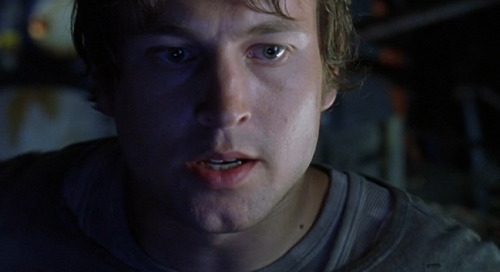
Axel from The Matrix Reloaded (2003) dir. Lily and Lana Wachowski
Being a Matrix franchise character, I've loved Axel long before I ever started giving a shit about Leigh Whannell as an actor/screenwriter. I love Axel so much, I would do everything and anything to save him. If I were a character in this universe and a resident of Zion, I would try to get him to stay home and never embark on the Vigilant. Do not doubt my commitment. I need him alive, I need to be his lover. I care about him.
Verdict: SMASH
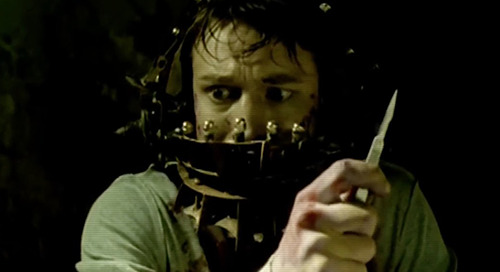
David from Saw (2003) dir. James Wan
There is absolutely nothing and no one that could keep me from pouring all of my energy and time and love and care into helping David defend himself legally after the events of the Saw proof-of-concept short film. I actually explained everything I would do if I were his defense attorney in this post. I don't really want to be his lawyer, though. I want to be his boyfriend. I want to be the one that posts his bail if possible... and, if not possible, I would come to visit him as often as I was legally and physically able to just to give him someone to talk to. I want to show up for his trial dates as moral support. I want to let him move in with me when he's finally acquitted and needs someone to lean on. I want to hold David. I want to hug him. I want to kiss him, kiss him softly. On the cheeks and neck and lips. I want to fuck this man. I will reset him, re-calibrate him, via prostate orgasm. I want to shatter his world and put it back together... who said that...
Verdict: SMASH

Adam from Saw (2004) dir. James Wan
I care very deeply about Adam. I would take care of this dude. I honestly just want to support him. I'm very aware of the fact that I have a service-oriented loyalty complex like some kind of human PTSD dog and I embrace that fact about myself. I love Adam like a really close roommate or a best friend or maybe an ex-boyfriend I'm on really good terms with and I still care a lot about platonically. I want to let Adam freeload. I want to let him move in with me and not pay rent because he needs the support and he's too depressed to care for himself lately. I want to wash his hair. I want to do his laundry with mine, I want to cook and share meals with him, I want to gently pressure him into calling his mom back because I want to see his situation and mood improve. I'd volunteer to go with him to appointments of any kind to be his advocate in any medical, business, social services or whatever setting. I'd know I'm not responsible for him but I'd want him to know he could lean on me when he needs it. But I don't really want to smash. It wouldn't be a non-option, but I'd much rather talk to him about politics and art over some dinner in our shared apartment.
Verdict: PASS
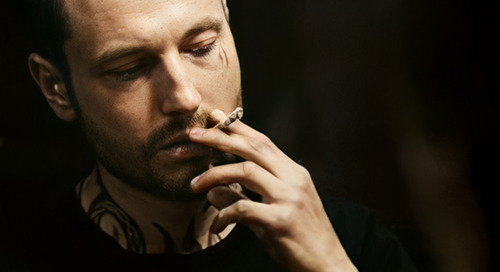
Spink from Death Sentence (2007) dir. James Wan
Anyone who actually, genuinely knows me knows that Michael Scofield from Prison Break was one of my first guycrushes... Not the actual first, but certainly one of them. Spink is the same kind of twink as Michael Scofield. Looks aside, he thinks he's tough and hard while compensating for shortcomings and vulnerabilities. I find that insanely attractive. I want to be the one who gets him off speed, I want to be the one who talks him into leaving the gang and fleeing to Canada or Alaska with me without police intervention so that he doesn't have to make deals he's uncomfortable with that will end up costing him his freedom and an actual chance at a fresh start. Where was I going with this? Doesn't matter. I'm smashing that twink.
Verdict: SMASH
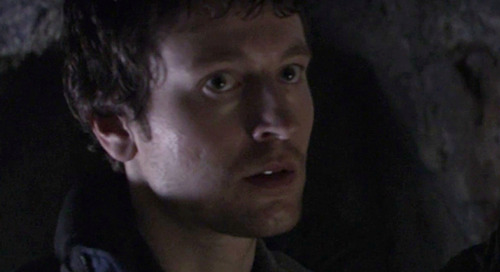
Matt from Dying Breed (2008) dir. Jody Dwyer
I can't, in good conscience, say that I would smash Matt, at least not on his own. Conditional smash. I'd want to be Matt and Nina's third. I don't want to get in the way of what they have. I think they're both so adorable. And, yes, I think they're both attractive and sweet. They clearly care a lot about each other and respect each other and show each other affection in a boundary-sensitive way. Because I live in denial, I also live in a fantasy world of my own interiority's creation in which Nina and Matt escaped their captors and managed to survive and they make it back to Ireland and I would absolutely be ready and willing to be their support person. I want to be their third, also in a roommate-like way, or maybe as a domestic partner? But I absolutely care about them and I'd do anything for them. The old "it's rotten work / not to me, not if it's you" and all that. Trauma-informed bisexual polyamory. Love wins.
Verdict: SMASH
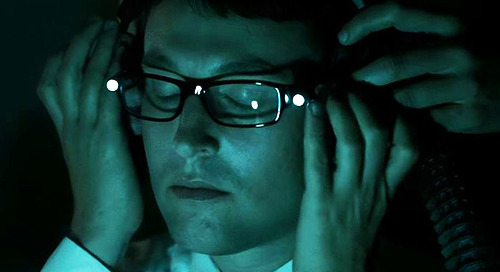
Specs from Insidious (2010) dir. James Wan, Insidious: Chapter 2 (2013) dir. James Wan, Insidious: Chapter 3 (2015) dir. Leigh Whannell, Insidious: The Last Key (2018) dir. Adam Robitel, and Insidious: The Red Door (2023) dir. Patrick Wilson
Jesus Christ, I am so fucking crazy about Steven "Specs" Fisher. I lose all composure when I see him. His dorkyass endearing nerd aura drives me insane with lust. I have never needed anything as badly as I need to flirt with him and make him feel special. Not to be NSFW but I will also note that I am a trans Specs truther and want it to be known that I can, would, and will eat this man out. I will handjob finger this man to several orgasms. As a stone butch service top, I'm a giver only so he doesn't have to worry about reciprocating, anyway, if that's a going concern. Sorry for how crude I sound, I just want to make this man cum.
Verdict: SMASH

Donovan from The Debt Collector (2012) dir. Rich Ceraulo Ko
Goddamn. I need to spot him from across the room at a dive bar punk show, make my way over there, tell him he has beautiful hands, pretty eyes, and a cute face, offer to buy him a drink, ask him if he wants to come back to my place, and hook up with him.
Verdict: SMASH

David from Crush (2013) dir. Malik Bader
Truth be told, I've never seen Crush. He looks like a nice enough guy. I wouldn't not smash... but he's definitely not at the top of my list.
Verdict: SMASH
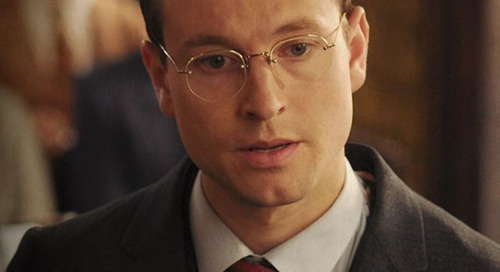
Clement from The Pardon (2013) dir. Tom Anton
Given the fact that Clement Moss was, in fact, a real man who actually existed and really did try and fail to defend an innocent woman from being sent to her death by electric chair in the 1940s, I must respectfully pass.
Verdict: PASS

Doug from Cooties (2014) dir. Cary Murnion and Jonathan Milott
Come with me on a little journey of imagination, will you? Imagine, with me, a desolate world where a rapidly-spreading virus has taken possession of a significant percentage of children across the country, the catastrophe quickly spreading to the rest of the world. Trust me, human encampments are popping up to defend against the zombie scourge. Think of one of the many enclaves of surface-dwellers in Fallout. Think of a camp like that where survivors have situated themselves advantageously, they function communally, and welcome clean, virus-free outsiders regardless of whether they can pitch in to help or not. I like to imagine I'd be keeping myself safe in a fort or a settlement like that, and I like to imagine that Doug and the band of teachers traveling together would be taken in by such a place, sanctuary rule style. Doug? Doug is a hard pass for me, sexually and romantically, but he seems like he could really use someone to talk at. So imagine, one last time, a group of adults prepping nightly communal dinner from non-perishable foods (we are 100% making some meatless chili with canned beans, corn, and other veggies and seasoning it well so that everyone has some comfort food before bed)... and, while I'm working the gas stove, keeping a big ol' batch of the vegetarian chili hot to serve, I let Doug take my chair and sit down and ramble and infodump away while I dish out servings to our comrades. Doesn't that sound nice? And, yes, believe me, I'll be trying to reform some of his wayward misconceptions about everything. I can't outright discard him. It may have been for comic relief but we're TBI buddies, so I empathize. He seems like a well-meaning dude with some issues that can be smoothed out, autism-to-autism communication style. So, respectfully, I pass.
Verdict: PASS
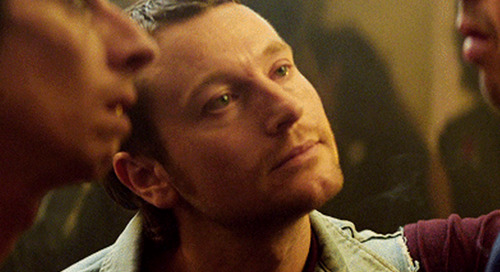
Gavin from The Mule (2014) dir. Tony Mahony and Angus Sampson
Good fucking grief. Gavin Alastair Ellis. Gavin would absolutely hate me for it but I would not be afraid to scrap, punch, bite, and claw Ray in order to lay claim over Gavin… and, listen, we can make the polyamory thing work but only as a throuple composed of two people who hate each other but who both love the person who serves as the keystone member of the relationship. That's the only way this is going to work. Ray's a sweet dude but he is not my type, not for this. Realistically, we'd probably be on very friendly terms because I do think Ray's alright… but I need Gavin in such a deeply carnal way so bad it makes me look stupid. Oh my God. This slut made me cry.
Verdict: SMASH

Larry from The Bye Bye Man (2017) dir. Stacy Title
You couldn't get me to feel anything for this man even if you forced me to at gunpoint.
Verdict: PASS

Matt from Keep Watching (2017) dir. Sean Carter
I need to fuck him sloppy... by the way, if you even care.
Verdict: SMASH
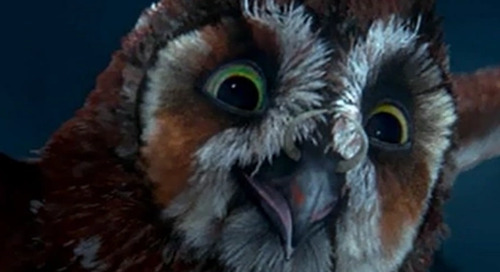
Jatt from Legend of the Guardians (2010) dir. Zack Snyder
This is literally an animated owl from a piece of children's media. DISQUALIFIED.
Verdict: HARD PASS
22 notes
·
View notes
Text

He really had no idea where things had gone wrong.
It should have been simple. He was eighteen, responsible, head of his class, and excelled in leadership challenges. He was a top-of-the-line Rescue Scout, he had all the badges. This should have been easy.
But it wasn’t.
It had been Virgil’s suggestion. Though more correctly a Gordon-suggested-Virgil suggestion. Scott would have much preferred a trip out to the local airstrip and John had made it very clear that he would have rather visited the local space centre.
But Virgil had pulled the ‘we always do aerospace, this is unfair to Gordon’ card. And the annoying thing was that Virgil was right. Gordon usually got the short straw in group activities because his interests lay in different areas to the vast majority of the family.
He did have a powerful advocate in Virgil, though. Fully capable of poking every button Scott had to get his way.
Younger brothers may be everything, but damn they could make life difficult.
Maybe the fates had sent this one as a learning experience.
He stared down at the chicken currently perched on his knee. It was one of the fancy breed types. Small, fluffy, barely able to see beyond the end of its beak, and exactly the perfect size to fit in Gordon’s pocket.
This wasn’t an empirically tested fact, but Scott could not work out how else his little brother had smuggled it out of the petting zoo. Perhaps he should be glad it hadn’t made it out of the actual zoo and onto public transport, or, god forbid, back to the hotel room…and Dad.
He was trying not to think about Dad too much right now, because explaining this was likely to get them all grounded until Scott had as much grey hair as his father.
Though at this rate, that might not be too far into the future.
“Scotty, can I have an ice cream?”
He turned to look at his tiniest brother and was assaulted by his big blue pleading eyes.
This was seriously not fair. His brothers had weapons like this that Scott had so much trouble denying. “No, I’m sorry, squirt, we have to stay here until the Zoo Manager comes back.”
“But I’m hungry.”
Gordon, still dripping wet, on the other side of Scott, poked his head around. “Told you, you should have eaten all your lunch.”
“Shuddup, Gordy.”
Hmm, maybe Scott had said that phrase a few to many times if Allie was picking it up. “Gordon, I wouldn’t be saying anything right now if I were you.”
“Hey, it wasn’t my fault.”
“Then whose, exactly?”
“I was saving Frilly! She can’t swim!” As if to emphasise that fact, the chicken on his knee fluffed up its feathers and flicked water in his face.
He closed his eyes and wiped a hand over his eyes. “And who exactly endangered Frilly in the first place?”
“She wasn’t in danger! I was protecting her!”
“By stealing her from her home?”
“Scott! We have a farm where she can play and be happy.” Gordon screwed up his face. “Not be trapped in that horrible cage.”
“Gordon, we have been through this. She is well cared for.”
But his little nine-year-old brother folded his arms over his chest, screwed up his face into a massive grump, and turned away from Scott, conversation ended.
Water dripped silently onto the wooden bench.
“I want an ice cream.”
Scott closed his eyes and sighed.
The chicken pooped on his jeans.
-o-o-o-
Perhaps it had been a bit much to ask of Virgil. His younger brother had spent most of the year eyebrow deep in his studies. It couldn’t be easy having John the genius waltzing through several subjects enough to catch up and then having to work alongside him to get final grades. There were three years between Virgil and John, but John was quick, and while Virgil was his own kind of smart, it didn’t equate academically to Johnny.
Virgil took it well, but Scott, while proud of both his brothers, knew it couldn’t be easy for the elder of the two.
So if Virgil had been distracted enough for this to happen…
No, that wasn’t fair. This was Scott’s responsibility and he trusted Virgil with everything.
When Alan had wandered off and disappeared, Scott had no issue with leaving his other two brothers under Virgil’s care while Scott tore through the zoo trying to find the missing three-year-old.
There had been announcements over the PA, staff alerted, and a hunt.
Apparently, while Scott panicked - yes, he would admit to himself that his response was a little haphazard and, if he was honest, frightened - Virgil had chosen to distract their two youngest brothers by taking them to the small aquarium.
After all, Gordon adored aquariums. Good decision. Excellent choice.
Perhaps not so much.
By the time Scott located Alan, who had somehow hitched a ride on a tour buggy that had disappeared into a jungle exhibit, both Gordon and Virgil were soaked to the bone, and John had been ‘arrested’ by zoo staff.
Hugging Allie to his chest, not sure he ever wanted to let him go again, Scott had walked into the aquarium to discover chaos - with his three brothers at the centre of it all.
John was the biggest surprise, really. His middle brother was the academic achiever, smart and more inclined to spend time with himself than hordes of friends.
But then they do say it is always the quiet ones.
John had dismantled a holographic sign, re-coded it and changed the display.
“What the hell? Why, John?”
Showing zero remorse and if anything, disgusted that he had had to go to the effort, his brother replied, “They were disseminating incorrect information. That was not a Leafy Sea Dragon, it was a Weedy Sea Dragon.”
Scott had stared at him for a full moment. “How the hell do you know that?”
John rolled his eyes. “He’s my brother, too, you know.”
And then he’d been mobbed by zoo staff demanding to know how to fix whatever it was he had done.
That left Virgil.
Who had fallen into the central aquarium itself while trying to get Gordon out of the water.
Did Scott love his fishy brother?
God, yes.
Did he want to throttle him?
There was a strong possibility.
Virgil could swim, of course, but it had been an aquarium with other denizens of the sea in there with him and while Gordon was quite happy chasing stingrays and sharks, Scott completely understood Virgil’s not so positive reaction to sharing marine real estate with them.
There may have been a little too much water swallowed and so much coughing afterwards that the zoo staff had called in their medical team.
Yes, Scott could feel a grey hair popping up through his scalp right about now.
Virgil’s apologies kept being cut off by his hacking cough.
So here Scott sat, a little brother either side of him, a chicken on his knee, one brother getting the third degree from the zoo technical staff, the other being given oxygen just in case he hadn’t finished drowning.
Scott’s brother radar was pinging in so many different directions he was at a complete loss how to respond. This was a new experience.
He always knew what to do.
But apparently not now.
So the sight of his grandmother walking through the door set off such a wave of relief he nearly went down under it all.
“Grandma!”
“Honey.” And he was wrapped in her arms, the chicken taking flight as he stood up, and two little brothers jumping in to make it a group hug.
She stroked his hair.
“Thank you for coming.”
“Always, honey.” She pulled away gently. “Now, get me up to speed. I need a sit rep.”
He stared at her.
Both the chicken and Allie were attempting to climb his legs.
So Scott Tracy straightened up, reported in detail…
And handed the situation off to his superior.
Grandma would know what to do.
-o-o-o-
#thunderbirds are go#thunderbirds#scott tracy#gordon tracy#alan tracy#john tracy#virgil tracy#thunderbirds fanfiction#nuttyfic reblog#tried to write but it is too late and my brain stopped working#sorry#though I did give poor Virgil a rash#that might appear upon my brain's return in the next few days
44 notes
·
View notes
Note
Can you give me some arguments about abortion and eugenics with black Americans in mind? My older sister is pregnant with her second child and everyone (our mom, her child’s father, our aunts and grandma) are pushing for her to have an abortion. She’s a great mom but she’s young and we’re poor. My moms also delivering ultimatums like she’s not helping her like with her son. I can tell she doesn’t want to but she feels a lot of pressure. I just want to help her feel supported and there’s another way.
Hello! I'm sorry your sister is being pressured into an abortion. That's horrible and completely unfair to her. Keep offering her emotional and moral support. I will link other resources to help support her and her children.
Margaret Sanger, Planned Parenthood's founder, was a known eugenicist who wanted to supply birth control and abortions to the black community because she believed their children would be burdens to the nation.
But Sanger's preferences went beyond race. In her 1922 book "Pivot of Civilization" she unabashedly called for the extirpation of "weeds . . . overrunning the human garden"; for the segregation of "morons, misfits, and the maladjusted"; and for the sterilization of "genetically inferior races."
Sanger's own racist views were scarcely less opprobrious. In 1939 she and Clarence Gamble made an infamous proposal called "Birth Control and the Negro," which asserted that "the poorer areas, particularly in the South . . . are producing alarmingly more than their share of future generations." Her "religion of birth control" would, she wrote, "ease the financial load of caring for with public funds . . . children destined to become a burden to themselves, to their family, and ultimately to the nation."
Following Sanger's death in 1966, Planned Parenthood felt so confident that it had safely buried her past that it began boasting about "the legacy of Margaret Sanger." And it began handing out cutely named Maggie Awards to innocents who often had no inkling of her real views. The first recipient was Martin Luther King--who clearly had no idea that Sanger had inaugurated a project to set his people free from their progeny. "We do not want word to go out that we want to exterminate the Negro population and the Minister is the man who can straighten out that idea if it ever occurs to any of their more rebellious members," Sanger wrote to Gamble. Had Dr. King known why he may have been chosen to receive the award, he would have recoiled in horror.
She also referred to people as "human weeds":
In promoting birth control, she advanced a controversial "Negro Project," wrote in her autobiography about speaking to a Ku Klux Klan group and advocated for a eugenics approach to breeding for “the gradual suppression, elimination and eventual extinction, of defective stocks — those human weeds which threaten the blooming of the finest flowers of American civilization.”
Here is more on how Planned Parenthood would target the black community.
Here is an article on Abortion’s Devastating Impact Upon Black Americans.
Planned Parenthood puts 86% of its abortion facilities in minority neighborhoods.
In the Black community in particular, abortion rates have become so high that abortion is a public health crisis. As Live Action News’ Danny David reported in 2016, “Relying on statistics from the U.S. Centers for Disease Control, the National Center for Health Statistics, and the Guttmacher Institute, the team of researchers concluded that abortion is responsible for… 61.1% of black American deaths, and a shocking 64% of Hispanic/Latino deaths – making abortion by far the leading cause of death for blacks and Hispanics/Latinos.”
One of my favorite pro-life activists is Dr. Mildred Jefferson, the first black woman to graduate from Harvard Medical school.
She also argued that the abortion industry was targeting the Black community. “Blacks suffer more from abortion because what looks like help is actually striking against them,” she said in 1977. “Blacks are fewer. They will disappear sooner.” This prediction has been sadly prescient, as Black women get a disproportionate number of abortions, the highest rate among all women, and in some cities, like New York, more Black children have been aborted in recent years than were born.
I'd recommend you read that article about her. She's an inspiration in the movement.
Here are some black pro-life organizations:
I would urge you to call 211 to figure out what resources are available to your sister in your local county.
You can see if your local Catholic church has a St Vincent de Paul which will give your family free food upon request and help pay a bill if needed. I know Baptist churches also offer financial assistance, if needed. You can save money on bills by getting food for free from food banks, as well. Visit or call your local crisis pregnancy center about what services they can offer to your sister. I know many pro-life centers will give her free baby items and baby clothes, and I know some offer mother support groups.
Here is a master list of available pregnancy resources:
Make sure she knows she's not alone and there are people out there willing to help support her. Keep offering her support! You're doing great! I'm sorry your sister is dealing with pressure from family to abort her baby.
Let me know if you need any other information! Hoping you are able to find helpful resources to help her choose life.
-Sarah
#abortion is racist#resources#pregnancy resources#thanks for the ask#ask#asks#sorry for responding late
135 notes
·
View notes
Text
Despite the 48 intervening years, the novella still comes easily and disagreeably. Davidson in particularly is frighteningly familiar, a white supremacist assured of his moral certitude, convinced that he has both the right and duty to murder creechies after they rise up from forced servitude and destroy a logging camp, killing some 200 Terrans. Following an interdict from Earth—a member of the new League of Worlds—that the Terran colonists of New Tahiti leave the Athsheans alone pending the League’s audit of the colony’s impact on the indigenous humans (an intervention pushed by Terran anthropologist or “hilfer” Raj Lyubov and two visiting non-Terran humans, a Cetian and a Hain), Davidson refuses to give up his crusade against the creechies. Like H. Beam Piper’s Little Fuzzy before and James Cameron’s Avatar after, Word for World pits the Bad Guy against the indigenous population as a representative of the worst aspects of human (Terran) life: a god-hero complex driven by greed, racism, and self-assured superiority over all life. The Davidson figure (Kellog in Piper, Quaritch in Cameron’s film) is juxtaposed by Lyubov, an anthropologist who advocates strongly for Athshe’s independence, representing a vaguely liberal they’re-human-too response to Terran expansionism. Word for World departs from the eco-capitalist fantasies of similar texts, from the idea that colonial expansion and resource extraction are OK but within reason, by presenting things from the indigenous perspective and not treating the “within reason” perspective as the final word on colonialism. In other words, Le Guin provides a strong case for the Athsheans’ swift and violent retaliation against the Terrans, including the killing of 500 women (newly brought to New Tahiti to “entertain” the two-thousand-plus workforce of Terran men) so the Terrans cannot “breed.” Readers of course are aware that the colony has a brand new ansible, has just learned of the League’s new interdict against conflict with the locals, and might very well lose their colonial charter. This is the “within reason” response: Earth learn that the colonists went “too far,” so an attempt must be made to reign them in; as Colonel Dongh, administrator of the colony tells Selver, temporary leader of the Athsheans upon the Terrans’ defeat, the release of “voluntary” laborers should have been enough to appease the Athsheans. This is the rhetoric of bullies and empires when their former victims are still angry: But we stopped murdering/bombing/enslaving you, so why’re you mad?
85 notes
·
View notes
Text
In the previous post I introduced Greenpeace. These are some wins from June posted on their website.
- Hyundai Construction Equipment commits to help stopping illegal mining in the Amazon
Greenpeace East Asia released the Stop the Excavators report in April of this year, calling to heavy machinery manufacturers to take measures that prevent their equipment being used illegally, in ways that cause violations of human rights.
This exposé revealed that Hyundai Construction Equipment is apparently the favoured brand used in illegal mining in Indigenous Lands in the Amazon.
Hyundai has now announced a series of measures to protect the forest, and will act to prevent this in the future.
- ReconAfrica suspends oil drilling in Okavango Delta
The Canadian oil company ReconAfrica has stopped drilling in Namibia’s Okavango Delta, after it was faced with lawsuits and environmental concerns. For now, the drillings have only been suspended, but this is a step in the right direction, proving that people power can work wonders.
In 2019, ReconAfrica announced fracking in some of Africa's most sensitive (both in terms of water supplies and as livelihoods for the communities in the area) environmental areas. Namibian youth climate activists, indigenous, environmental and human rights groups have been working since then to prevent this from happening.
- ASEAN steps up commitment to end forced labour and human trafficking practices of migrant fishers
In May 2023, ASEAN (Association of Southeast Asian Nations) leaders officially adopted the first ASEAN Declaration on Migrant Fishers Protection in history. This declaration follows many years of active campaigning by human rights advocates and civil society organizations. The campaign aims to push stronger policies to protect Southeast Asian migrants working in fisheries and their rights.
This declaration emphasised that protecting and fulfilling the rights of migrant fishers is an entire migration cycle (recruitment, placement, and repatriation), and so is a shared responsibility among the ASEAN states.
- Local fishers and civil society join forces to reforest mangroves in Senegal
The local community in the traditional fishing town Joal in Senegal started reforesting mangroves in a show of what direct action is really about.
Joal is located near mangrove forests, that are essential breeding grounds for many fish species, and are vital therefore for the fishing communities in those areas. They also store more carbon than tropical forests, and are capable of curbing climate impacts such as floods.
- Dutch creative agencies choose to no longer work with fossil fuel companies
23+ creative agencies in The Netherlands put together a Fossil No Deal, stating that they will stop working with fossil companies and no longer encourage fossil passenger transport. They call it verdrag verantwoord verleiden, a treaty for responsible seduction.
- Thailand applies new PM2.5 ambient standard
In the beginning of June, the new PM2.5 ambient standard was officially applied in Thailand.
The new standard is now 15 μg/m3 for the annual standard and 37.5 μg/m3 for 24-hour standard, which is in keeping with the revised WHO air quality guidelines. This is a big step in the right direction to help reduce PM2.5 and solve air pollution in the country.
Greenpeace Thailand is still not at rest, though, and are continuing to fight to get the PM2.5 at its source, that is from the industries.
- In New Zealand, FSC abandons plans for ‘GE learning’ process
Greenpeace Aotearoa and other environmental organizations have been pressuring the Forest Stewardship Council (FSC) certification scheme to abandon its plans for a ‘Genetic Engineering (GE) learning’ process.
The long-standing principle of not certifying GE trees came under threat after pressure from FSC certified plantation company Suzano from Brazil that has a subsidiary doing GE eucalyptus tree research trials (for glyphosate resistance).
- Citizens say yes to net zero emissions in Switzerland
Swiss citizens have voted in favour of a new law to reach net zero emissions by 2050. The new climate law, which was initiated seven years ago, passed a referendum with about 59% of the voters.
Net zero is now enshrined in the “federal law on climate protection, innovation and strengthening energy security“.
Let me know if there's anything else you'd like to see, news from your own countries, or if you'd like to add anything or share.
I'm also here to listen, my DMs and Asks are always open :)
Love you all, and see you next time, be safe!
#climate#hope#good news#more to come#climate emergency#news#climate justice#hopeful#positive news#positivity#greenpeace#climate change
37 notes
·
View notes
Text
Often, in various spheres, I see people who support radical policies, but only to a point. AO3 antis are a great example. Abortion advocates are another. As are prison abolitionists.
The true believers don't have a limit and are fantastic, but there are people within each movement--and in many more--who only support that movement up to the point it discomforts them.
AO3 should host everything.....except that stuff I think is gross or wrong.
Abortion should be freely available.....except the late term stuff that makes me morally queasy.
Prison abolition is the goal....except for rapists and murderers.
And, I get it. That last one? Prison abolition? That's really difficult for me to wrap my head around. Do I agree that the prison system is unjust? Yes. Do I believe that prisons breed crimes and decrease safety? Yes. Do I believe that resources are better spent on decreasing the social factors that lead to crime? Yes. Can I support not locking up a serial killer? .......No.
But! There's two responses, here, right? One response is to limit the thing, to say "Prison abolition still involves minimal prison use for violent offenders."
By changing the cause, I can pin the shiny "Prison Abolitionist" label to my lapel without having to grapple with the discomfort. This approach requires changing how people see the movement, though. It requires telling true prison abolitionists that they're dangerous zealots and wrong. For this to work, I can't be the only one who holds to my new definition of the cause.
The other response is to accept that I can't call myself a prison abolitionist. If I cannot fully support the movement, despite my own discomfort, if I cannot let myself grow toward wholehearted belief, I cannot label myself as an abolitionist. I have to admit that some part of me is against it--which is another very uncomfortable thought, to be honest.
It is easier and more comfortable to redefine the cause. But this route pushes that discomfort on other people and hurts them. It can create situations where supporters are fighting on two fronts--internal and external.
It is better to wrestle with the discomfort, to talk with yourself about why you cannot support the cause fully or why it matters so much to you to be part of it. But that doesn't feel good to do. It is harder and more private.
Anyway, I hope if you have a cause that you find yourself wanting to draw tighter limits on, that you pull back and reflect rather than try to make a movement more palatable for yourself.
20 notes
·
View notes